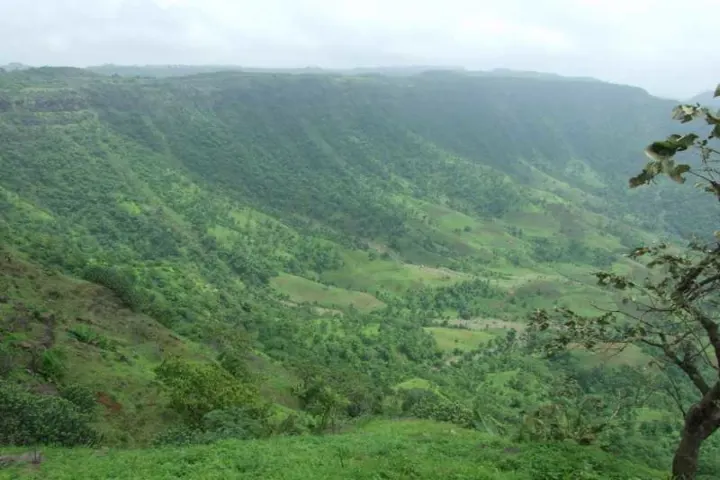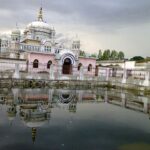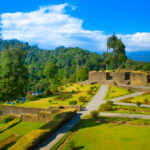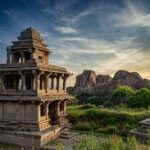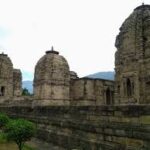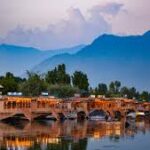Now Reading: Top 10 Best Places to Visit in Nanded for Spirituality, History & Nature
-
01
Top 10 Best Places to Visit in Nanded for Spirituality, History & Nature

Top 10 Best Places to Visit in Nanded for Spirituality, History & Nature
1. Hazur Sahib Nanded

Hazur Sahib Nanded: A Sacred Sikh Shrine and a Historical Treasure
The holiest Sikh site Hazur Sahib Nanded exists along the Godavari River inside Nanded city throughout Maharashtra. The site attracts followers of Sikhism and travelers worldwide as it represents both Sikh faith and history and spiritual practices. The Takht Hazur Sahib functions as the most sacred shrine in Sikhism because it contains the remains of the tenth Sikh Guru Guru Gobind Singh Ji and is among the five Sikh authority seats. Hazur Sahib Nanded serves more than spiritual functions since it represents Sikh history and cultural heritage while maintaining its status as a historical relic.
Spiritual Significance
The sacred town Hazur Sahib Nanded serves as an important spiritual center for Sikhs since this is where the tenth Sikh Guru Guru Gobind Singh Ji lived his final years of life. Beyond his founder role for the Khalsa Guru Gobind Singh Ji earned eternal recognition for his absolute dedication to justice along with his belief in equality. He died in Nanded during 1708 when he left a permanent impact on both Sikhism and human history.
The Sachkhand Sahib Gurudwara at Hazur Sahib serves as a main religious sanctuary where devotees can venerate the Guru Granth Sahib as the central religious scripture of Sikhism. People from all walks of life visit the site because it provides them an opportunity to worship the Guru and obtain blessings while learning from his teachings. Visitors experience inner peace as well as tranquility when they join the divine atmosphere which is full of hymns and prayers.
Historical and Cultural Importance
The sacred site of Hazur Sahib Nanded serves as both sacred landmark and historical landmark which celebrates the robust Sikh heritage and cultural tradition. Nanded maintains its historical significance as the city bore essential events while Guru Gobind Singh Ji existed. The Guru intentionally chose his last resting place at Nanded after his life-threatening injuries sustained during combat. His appointment of the Guru Granth Sahib as religious successor proved to be a pivotal event in history because it made the Guru Granth Sahib an eternal guide for Sikhs.
The foremost historical milestone linked to Hazur Sahib involves Banda Singh Bahadur who led the Sikh struggle for justice when he actively contributed to the region. Hazur Sahib remains significant for Sikhs because Banda Singh Bahadur who was a close follower of Guru Gobind Singh Ji still receives recognition through commemorations of his historic military achievements.
The religious destination Hazur Sahib attracts people for faith practices and serves as a base for educational and cultural activities. Visitors to this Gurudwara can experience the rich cultural heritage of the region because its architecture harmoniously combines Mughal and Sikh architectural features. Visitors marvel at the splendid shrine because its grand structure features elaborate designs and lovely ceiling paintings alongside shining golden domes against the skyline.
Best Time to Visit
Hazur Sahib Nanded experiences its most favorable weather conditions between October through March which makes these winter months the best time to visit for sightseeing and spiritual activities. Traveling to Hazur Sahib Nanded becomes uncomfortable during the monsoon season from June to September along with the hot summer months.
2. Kandhar Fort

The historical Kandhar Fort stands one hour’s travel distance from Nanded city. The enchanting location of Manyad River allows Kandhar Fort to hide its collection of ancient cultural histories from different eras across the region. Through its long existence this ancient structure demonstrates the valuable cultural heritage of Maharashtra.
Travelers who want to explore something different along with history buffs and architecture admirers should visit Kandhar Fort as their perfect tourist stop. Mutual elements linking Hindu religion with Jainism and Buddhism along with Rashtrakuta period development have established Kandhar Fort as one of Maharashtra’s most historical landmarks.
Historical Significance
The Rashtrakuta-era Kandhar Fort underwent changes in control by numerous dynasties throughout its existence starting from approximately 1000 AD. The Rashtrakuta rulers constructed the fort as a defensive fortress because they were known for their achievements in both art and architecture. Various dynasties such as the Yadavas and Delhi Sultanate took control of the fort followed by Mughal dominion during different time periods.
The historical value of this fort increases because it contains evidence from multiple ethnic settlements. Seoarce presents significant evidence of Hindu, Jain and Buddhist motifs in its intricate architecture which demonstrates the various religious groups who resided there in ancient times. Visitors can witness cultural influences throughout the intricate stone details and temple construction within the fort as well as throughout the entire fortification design.
Kandhar Fort stands bordering the Manyad River thus producing both picturesque beauty and charm. The mixture of historic fort grandeur and the peaceful Manyad River generates a relaxing setting suitable for exploring and relaxing. Nature enthusiasts find various beautiful sunset viewing spots besides captivating panoramic views across the hills which surround the area.
The site of the fort against the riverbank provides a beautiful setting for photographic captures of its historic architecture. At Ranthambore Fort people can find complete relaxation because nature surrounds the fort while river sounds create a perfect peaceful environment for tired city dwellers to escape.
Best Time to Visit
The most appropriate season for Kandhar Fort exploration occurs during winter from October through March. The period from October to March offers ideal weather conditions for visiting the fort complex and its adjacent areas. Heavy monsoon rains during June to September create unfavourable conditions for exploring both Kandhar Fort and nearby areas. Tourists should plan their visits to Kandhar Fort in the moderate winter season because the summer months usually remain very hot.
3. Kaleshwar Temple

The Kaleshwar Temple in Nanded Maharashtra is situated peacefully by the Godavari River to become a renowned pilgrimage destination for Hindu worshipers. Lord Shiva receives worship here in an ancient temple which welcomes people seeking peace after religious touristic activities. The Kaleshwar Temple welcomes everyone including passionate worshippers and peaceful seekers through its magnificent surroundings and spiritual ambiance.
Religious devotees and tourists view Kaleshwar Temple as a place of great importance in both local and travel experiences. Lord Shiva stands as one of the primary Hindu deities whose worship temple Kaleshwar serves at its heart. Devotees make pilgrimages to this temple throughout the years because it has maintained its status as a religious worship center for countless centuries. The temple’s serene sacred environment produces divinity which touches the soul of visitors.
Lord Shiva appears as a Shiva Lingam at the temple which functions as an antique representation of the divine and shapeless nature of Shiva. The temple designers worked to create surroundings and construct architectural features which both elevate spiritual connections with the divine power.
The Spiritual Ambiance
Kaleshwar Temple creates an immediate peaceful atmosphere which dominates the whole temple property. Application of serenity comes from the Godavari River positioned adjacent to the temple that adds peaceful effect through its quiet water patterns. Meditation and spiritual revival experience is possible thanks to the peaceful water sounds from the flowing water at this sacred area.
The optimal time to achieve peace at this temple exists during its opening hours during the sunrise. The temple maintains lower levels of crowds at this time along with a peaceful environment which allows visitors to experience spiritual energy. The beginning of the day brings peaceful conditions through the gentle wind while revealing the sight of the Godavari River which creates a deep state of calmness and reflection.
Temple Architecture and Features
The Kaleshwar Temple presents a timeless architectural design that matches the style of other historical Hindu temples. Primary worshippers of Lord Shiva at the temple follow traditional practices by incorporating stone-carved pillars around their Shiva Lingam sanctum. The prakaras’ walls exhibit Hindu deities along with various images carved throughout their surfaces.
The temple gains its appeal from Godavari River which flows in its proximity because Hindus regard the river as sacred for conducting their religious rituals. People who visit the temple typically make a religious water immersion in the river as a way to cleanse their spirit and make their worship more powerful.
The Serene Godavari River Banks
A visit to the temple should conclude with a restful moment at the banks of Godavari River. The relaxed atmosphere of this space creates a perfect environment for meditation and relaxation as well as calm water observation. The attractive panorama of the flowing river among verdant foliage at this spot enables you to fully savor your spiritual temple experience.
The threshold to riverfront relaxation offers you ample opportunity for a laid-back trail beside this river where you can feel its soothing wind and drink in its pure natural beauty. Kaleshwar Temple stands as an excellent photographic venue because its beautiful natural setting harmonizes nature with spirituality while presenting many chances to document this blend through pictures.
Best Time to Visit
Visit Kaleshwar Temple at morning hours to enjoy complete serenity because the temple’s peaceful ambiance reaches its peak. The religious site welcomes visitors during all day hours from 5:00 am until 12:00 am.
Different feelings can be experienced at the temple between morning and evening visiting times. The evening visit allows you to experience the evening prayer ritual known as aarti that completes a spiritual temple visit.
4. Mahur

Located in the green hills of Maharashtra stands Mahur as a religious site which provides both relaxation and spiritual enlightenment. The town of Mahur lies about 129 kilometres distant from Nanded in the Nanded District of Maharashtra while bringing together mythology and historical parts with religious importance. People should visit Mahur because this town combines historical temples together with outstanding natural scenery to present a prime destination for finding spiritual peace.
Visit Mahur
The town Mahur unifies religious sanctuary together with environmental beauty. Devotees together with nature enthusiasts find this place appealing because the area combines tranquil ambience with historic heritage and divinatory temples. The town of Mahur welcomes both pilgrims who seek blessings and tourists who wish to explore its natural beauty in Maharashtra.
- Renuka Devi Temple
Renuka Devi Temple stands as the main attraction in Mahur because it holds the status of one of the revered Shaktipeeths. According to tradition Renuka Devi arrived on earth at this location when she became the mother of Lord Parshuram. Visitors can reach the temple by following a route to its hilltop position where they will find breathtaking views across the valleys that extend into the forested areas. Believers travel from all parts of India to visit this temple because they want to receive divine blessings and absorb the sacred energy permeating through the temple.
One of the 51 Shaktipeeths
Native people venerate Renuka Devi as the divine manifestation of strength along with maternal love
During the Navratri celebrations the temple sees tremendous crowd activity because of its grand religious events.
- Kalika Temple
Goddess Kalika receives worship in this temple which is renowned for both its typified architectural design and its peaceful location. During major festivals the temple holds prayers and devotional music as the goddess idol gets adorned with lavish decorations. - Jamdagni Temple
Rishi Jamdagni receives worship at this temple because he happen to be Lord Parshuram’s father. Through its design it represents reverence and ancient Vedic traditions. The temple rests in midst of hills and natural vegetation while providing peaceful environments for both reflection and inner contemplation. - Devdeveshwar Temple
Both locals together with visiting travelers hold the temple in strong reverence. Furthermore it served as the place where divine beings and holy sages conducted their meditation while they filled the environment with solemn power. Years of pilgrims come to this temple to experience its natural splendor while seeking spiritual moments.
- Parshuram Temple
Lord Parshuram receives worship at this temple which dedicates itself to the sixth Vishnu incarnation. The temple maintains its location in a tranquil and scenic location. The location stands as a religious and historical landmark since Lord Parshuram chose this site to carry out his spiritual practices.
The town presents more than historical sites because it embraces the beautiful combination of elevated mountains and thick forest regions which enhance its appeal. The town maintains an ideal setting for rest and refreshment because breezy weather along with natural bird noises and beautiful landscapes combine to create this perfect place. Passing through hills during a walk or settling in peaceful natural spaces provides a memory you will remember forever.
🏡 Best Time to Visit
The winter months from October to February present suitable weather conditions which make temple visits and sightseeing pleasant.
During Navratri numerous devotees gather at Renuka Devi Temple for a magnificent festival.
5. Sahasrakund Waterfall

Sahasrakund Waterfall lies at the peaceful Painganga River location of the Nanded district where visitors can discover an extraordinary natural attraction. Travelers consider this waterfall to be one of the major attractions in Nanded because its natural beauty becomes most spectacular during the rainy season.
Why Visit Sahasrakund Waterfall?
You will stand speechless in front of the 50-foot drop of Sahasrakund Waterfall which offers an incredible sight. Visitors can experience an ideal escape from urban life while they listen to waves striking rocks and breathe in atmospheric mist at Sahasrakund Waterfall.
Highlights of Sahasrakund Waterfall
Visitors can enjoy both photography and relaxation at Sahasrakund Waterfall because of its scenic context featuring rich greenery.
The two ramps extending from both sides of the watercascade allow visitors to reach breathtaking panoramic views while admiring the waterfall and landscape vista.
The rainy period from June to September stands as the most favorable season to see Sahasrakund Waterfall at its magnificent peak due to the elevated water levels.
Adventure-oriented visitors and nature enthusiasts will find this spot as their ideal destination
The Sahasrakund Waterfall appeals to relaxation-oriented visitors and those who desire thrilling experiences so it fulfills every visitor need. Enjoy swimming in refreshing waters or settle into enjoying the surrounding natural beauty of Sahasrakund Waterfall.
Tips for Visiting Sahasrakund Waterfall
Comfortable footwear should be carried because rain-filled paths near the waterfall become hazardous during the monsoon season.
Your visit requires a camera because any snapshot taken here will quickly become a stunning Instagram upload.
Since there are no significant food stalls close by visitors should bring their own water bottles along with snacks.
Location and Timings
📍 Location: F234+992, Saharsrakund, Murli, Maharashtra 445207
🕰️ Timings: Open throughout the day
Related articles : Top 10 Best Places to Visit in Latur for History, Nature & Spirituality













